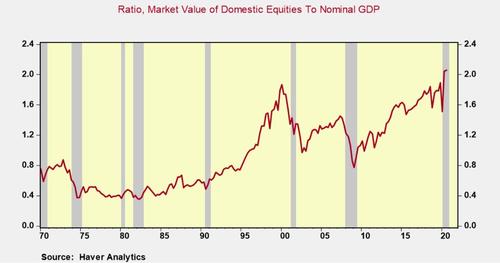2021 Could Be The Opposite Of 2020: Economy Up, Equities Down
Authored by Joe Carson, former chief economist and director of research at Alliance Bernstein,
2020 has proved to be a wild ride for the economy and finance. The economy posted its sharpest one-quarter decline to be followed by the largest quarterly gain. Meanwhile, the Dow Jones Index recorded the 10 largest daily percentage point declines and the 8 largest gains.
2021 could prove to be just as wild. But ending with opposite outcomes with the economy up and the equity markets down.
Here’s why.
First, in 2020 the divergence between the economy and finance has never been this wide. When the final numbers are in, the US economy will shrink 2% to 3%, while the broad equity market will record a gain of around 15%, twice its annual average.
Finance often records double historic annual gains, but not during a recession. During the prior three recessions, the equity market declined each time, with declines as small as 6% and as big as 38% for a calendar year.
So in 2020 finance is far ahead of the economy or the economy is far behind finance. A reversal with the economy growing and markets stalling or declining would bring about a better alignment.
Second, the 15%-plus gain in 2020 comes on the heels of a near 30% gain in 2019. The back-to-back large gains have increased the market value of equities by a record $12 trillion. That’s roughly twice the two-year gain that followed the Great Financial Recession when equities were cheap on all valuation metrics.
Market valuations increase over the course of the cycle as investor’s optimism increases. For example, over the course of the 1990s expansion, the market value of domestic equities to nominal GDP rose from .6X times at the start to 1.86X at the end. And during the economic expansion of 2001 to 2007, the market peak valuation reached 1.45X times, well up from the cycle low of below 1.
The market value of domestic equities to nominal GDP currently stands at a record 2X+times. Starting a new economic cycle with a record high valuation is unprecedented. Two of the past three economic expansions started with a market valuation to nominal GDP below 1.
Investors apparently believe that policymakers have all the tools and wits to prevent the equity market from declining ever again. The contrarian in me will take the other side of that bet; economic and market cycles live on, and policymakers are not wizards of finance.
Third, the medical vaccine could be a big positive for the economy and a big negative for monetary policy. That’s because as more and more people get vaccinated risk of business closures and layoffs subside quickly and substantially. As a result, the economic rebounds forcing monetary policy at some point in 2021 to end its unprecedented easy money policy.
Admittedly, policymakers have linked policy decisions to the outlook on inflation, not growth dynamics. But core inflation at 1.7% is 100 basis points above the low point following the Great Financial Recession. So a fast economic recovery could push inflation up above the 2% mark much sooner than many, including policymakers, now expect.
Investors seem to overlook or forget how sensitive equity prices and valuations are to the slightest change in monetary policy. It wasn’t too long ago when the Fed announced the end of the asset purchase program equity markets reversed course and recorded larger declines when policymakers talked about lifting official rates above the 2% mark.
There is no precedent for the uneven economic and financial outcomes of 2020. As a result, there is no precedent for what happens next. Even though the downside risks for equities from a recession were reversed in 2020 by unprecedented policy actions does not automatically mean the equity market should trade even higher when the economy recovers. 2021 could very well play out the opposite of 2020; the economy growing and the equity market falling.
https://ift.tt/2WZoLAa
from ZeroHedge News https://ift.tt/2WZoLAa
via IFTTT





0 comments
Post a Comment